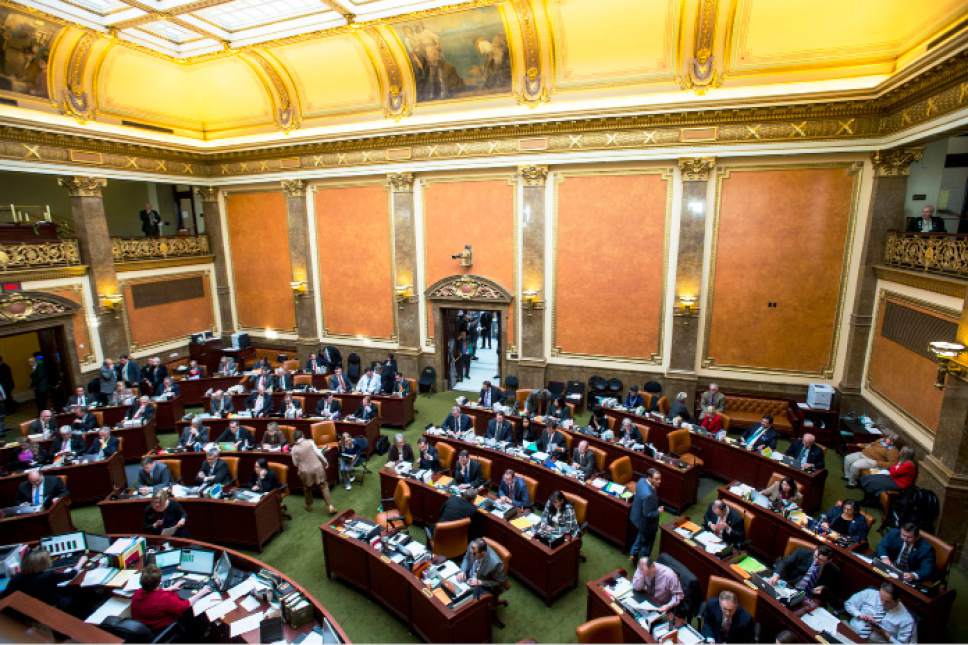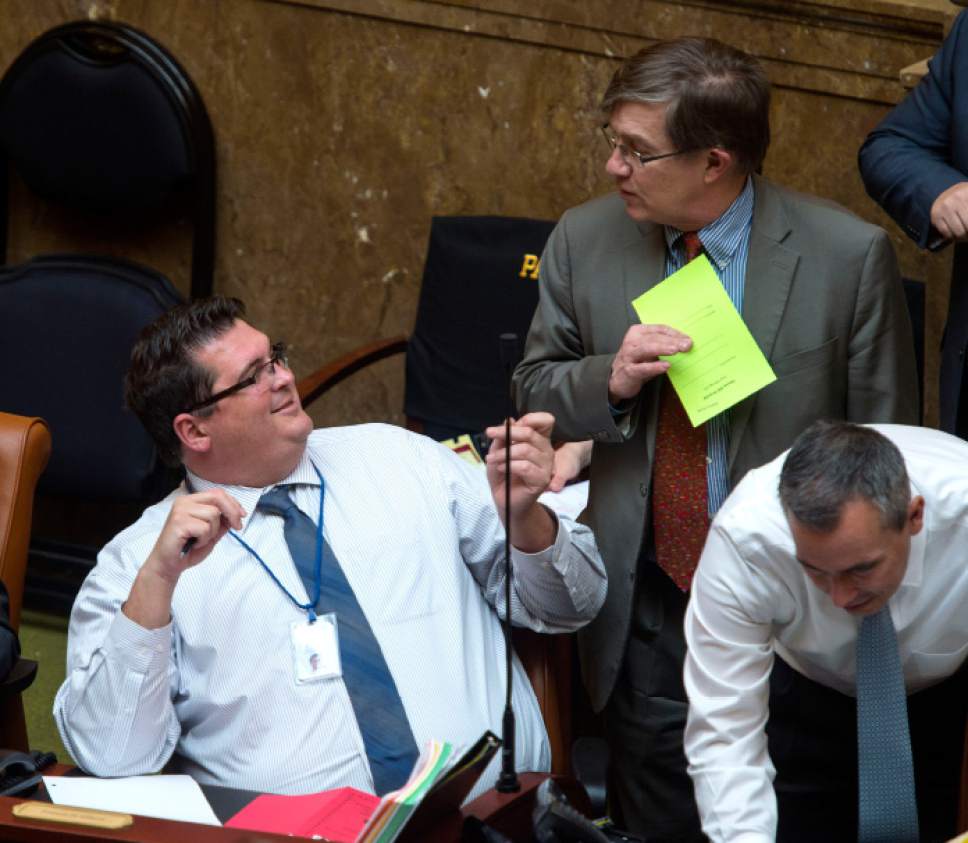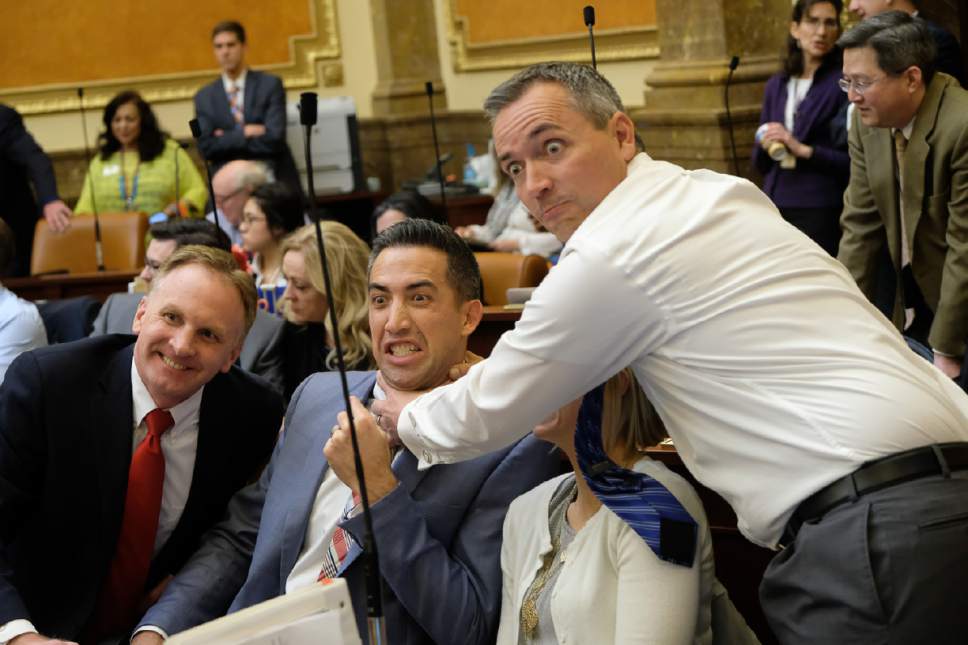This is an archived article that was published on sltrib.com in 2017, and information in the article may be outdated. It is provided only for personal research purposes and may not be reprinted.
A paradox has emerged at the Utah Legislature: Because Republicans rule by a supermajority, they fear Democrats less — so they tend to collaborate with them more, according to one political scientist.
The results tell the story. Democrats this year passed half of their bills, while controlling only one-sixth of the votes. Party-line votes ended up being fairly rare, and a typical bill passed with bipartisan support by more than 90 percent of all legislators.
"The partisan rancor that pervades national politics seldom reaches the Utah Legislature," said Adam Brown, a Brigham Young University political science professor, who reviewed and analyzed votes by the Legislature this year.
While the ideology gap between the parties is just as big or bigger here than in other states, Brown said Republicans have no overriding political need to block Democratic bills that they may like.
Republicans hold a 24-5 majority in the Senate, and a 62-13 edge in the House — or 83 percent of all seats.
Brown said when a minority is within striking distance of taking the majority — usually the case in Congress — the majority has "a strong incentive to show your party is the one who governs well, and you do that by preventing their party from getting their ideas through — and by getting your own through."
But in the Utah Legislature, "Republicans have nothing to fear from Democrats. They don't have to worry that Democrats, by passing some bill, may go to voters and say, 'Look at what we did, you should make us the majority.'"
Also, he says Utah Democrats for years have chosen not to be mere bomb throwers at Republicans, except on the bills that they view as most egregious, trying generally "to get along to go along."
"So you have it on both hands: Republicans aren't worried about Democrats, and the Democrats have chosen not to worry them by mostly playing a gentler strategy that allows them to have more success than if they were to get in the face of leadership," Brown said.
—
Leaders' views • Legislative leaders largely agree with Brown, but quibble about the reasons behind the bipartisan collaboration — and note that some bitter exceptions exist.
"I think that we as Democrats try to be smart in working with our Republican colleagues," House Minority Leader Brian King, D-Salt Lake City, said. "For the most part, we don't throw bombs just to throw bombs… but there are times you have to stand up for your beliefs" and may pay a price for that.
For example, he said Democrats strongly opposed a bill that would remove requirements for partisan diversity on dozens of state boards and commissions. Republicans, seeking at least some Democratic support, removed a few boards from that list that seemed to be more political in nature.
"It made a terrible bill just a crappy bill," King said. All House Democrats still opposed it. So Senate Republicans amended it back to its original form.
King said several Republicans told him that was done to send a message essentially that "if you don't vote for the bad bill, we're going to pass the terrible bill." Democrats opposed it loudly, and watched it pass on a largely party-line vote.
Still, King notes he is usually able to criticize bills without retribution. "As long as I don't get personal, I have a lot of leeway — and I appreciate that."
Senate President Wayne Niederhauser, R-Sandy, said, "We try to work things out, not just throw political bombs at each other."
He notes that with the big GOP majority in the Senate, "I could just completely make Democrats irrelevant ... but that's not what I want to happen. I want there to be a cooperative spirit of working out policy issues. We want to be a Senate that works together no matter what party you are in."
He said that includes meeting regularly with Senate Minority Leader Gene Davis, D-Salt Lake City, to work out problems and complaints — and even ensuring Democrats are represented in the Senate leaders' daily news media briefings.
"I think it's a lot better when everybody is part of the process," Niederhauser said.
House Speaker Greg Hughes says the main reason that most bills do not ignite partisan firefights is that they are about more workaday policy that has little to do with party politics.
"The issues that are probably more ideological, you're going to see the divide," he said, and pointed to a bill King proposes every year to allow comprehensive sex education in schools.
"I don't think a lot of the stuff we stare at as a Legislature is necessarily Republican or Democratic, it's just policy," he said, adding lawmakers of either party can have success if they work hard.
"I think that almost all bills, regardless of party, passed by supermajority margins," Hughes said.
—
Voting statistics • Data from Brown show that this year, bills passed with an average of 93 percent support in the House, and 97 percent in the Senate. That is a record for the Senate for the 11-year data series Brown has collected.
Party-line votes were relatively rare. They occurred on only 6 percent of the votes in the Senate, and 13 percent in the House.
Only three House floor votes were decided by a one-vote margin, and three votes in the Senate were decided by one vote or by a tie.
Brown also found that Democrats passed 53 percent of their bills, while Republicans passed 68 percent.
Only 1 percent of bills failed in floor votes in the Senate, Brown found, and only 2 percent failed in the House. (Many bills are killed in committee, or die by not even receiving consideration).
Brown noted that Sen. Jerry Stevenson, R-Layton, did not vote against any bills in floor votes. Five other lawmakers cast "no" votes only 1 percent of the time: Hughes and Sens. Gregg Buxton, R-Roy; Dan Hemmert, R-Orem; Niederhauser, R-Sandy; and Senate Majority Leader Ralph Okerlund, R-Monroe.
—
Record for bills • The 2017 Legislature passed a record 535 bills, out of 810 that were introduced. That beats the previous record of 528 passed in 2015.
The Legislature this year managed to give more bills more time for consideration, compared to previous years — with some notable exceptions.
The average bill aged 17.2 days between its introduction and first floor vote — and 9.2 more working days until its final passage during the 45-day session. That is longer than recent years, and Brown said it shows fewer bills are being introduced late in the session.
But some major bills on homelessness and liquor reform emerged late and sped through to passage. Two bills calling for borrowing a combined $1.1 billion for the new state prison and state highways were passed one day after their introduction or first hearing.
—
Keeping score • Brown's research also shows which lawmakers passed the most legislation, or none at all.
The most prolific bill passers were: Sens. Wayne Harper, R-Taylorsville, 23; Karen Mayne, D-West Valley City, 18; Curt Bramble, R-Provo, and Todd Weiler, R-Woods Cross, 17 each; Lyle Hillyard, R-Logan, 15; and 11 each for Lincoln Fillmore, R-South Jordan; and Rep. Becky Edwards, R-North Salt Lake.
Twenty different lawmakers passed 100 percent of the bills they introduced. Some of them introduced as many as 15 (Hillyard), or as few as one (by four legislators including Hughes).
Three lawmakers did not introduce any bills: Niederhauser, and Reps. Jon Stanard, R-St. George, and Christine Watkins, R-Price.
Two legislators introduced bills, but failed to pass any. Sen. Jim Dabakis, D-Salt Lake City, went 0-for-5, and Freshman Rep. Elizabeth Weight, D-West Valley City, went 0-for-3.
Also, Rep. Rebecca Chavez-Houck, D-Salt Lake City, passed only one of nine bills, or 11 percent. Lawmakers who passed only 20 percent of their bills included Reps. Joel Briscoe, D-Salt Lake City; Kay Christofferson, R-Lehi, Dixon Pitcher, R-Ogden; and Marc Roberts, R-Santaquin.







